

Marvel Comics Presents ran for 175 issues from 1988 until 1995. Each issue included four eight-page stories with typically two or three on-going features (and no ads). It spotlighted some of the leading creators of mainstream comics over a period of precipitous economic growth and even more rapid decline. Reading through it is an opportunity to revisit any number of weird aspects of 90s superhero comics. This blog is a primitive, oddly regimented, manifestly scattershot crawl through an often disappointing but occasionally splendid comic. All image copyrights are Marvel's. Issue credits linked below. Updated on Wednesdays.
Marvel Comics Presents #13: Late February 1989(12.18.19)
Credits: grandcomicsdatabase
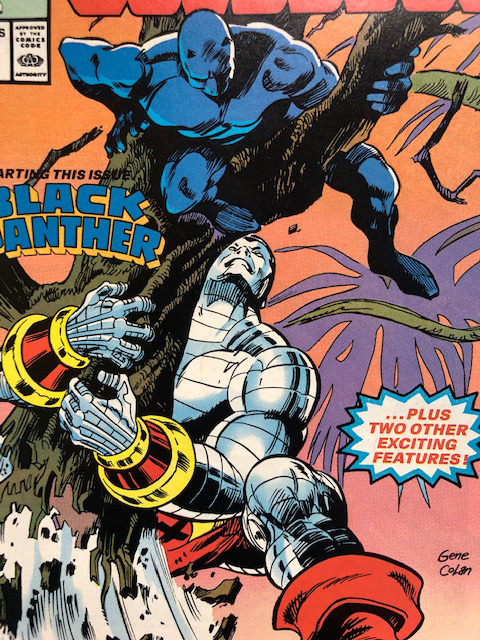
There's something not-quite-legible about this Gene Colan piece, which is a two-hander featuring Colossus and Black Panther. It might be Colan's threaded, naturalistic style, which is on full display in the form of Colossus' straining physicality. The more likely suspect is, I think, the incoherent positioning and dimensions of T'Challa, perched above Colossus. The result is less than the sum of its parts, but a sight better than the underbaked Shanna on the rear. Spinning the Sue and Reed portion as an homage to romance comics is, for historical and aesthetic reasons, a nice touch and ultimately a better tribute piece than last issue's Frenz/Sinnott piece.
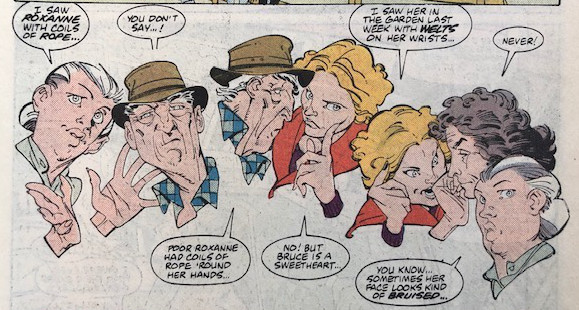
A. Colossus, "God's Country" [4/8]
The breakneck narrative jumps are slowing a bit as the stand-off with Colossus, middle America, and shadowy cyborg thugs begins to play out. And, while plot-level articulations are proving easier to digest, Nocenti's increasingly anodyne politically commentary is starting to seem aimlessly grafted on to this feature. (What began as pointed critique of American jingoism has been hammered into vacuous observations that "the US and the USSR each have problems.") Fortunately, the layouts are an unabashed delight here and the Leonardi/Russell pairing hits a high point, conveying an impressive sense of place as well as some exceptionally legible action work. The pacing and ability to work across dusk and evening settings is especially commendable. Ultimately, there's an appealing, cartoonish feel here, which interacts in such a peculiar way with the urgency and the polemical dialogue, that it's hard not to be curious about the workings of this feature even when the story falters.
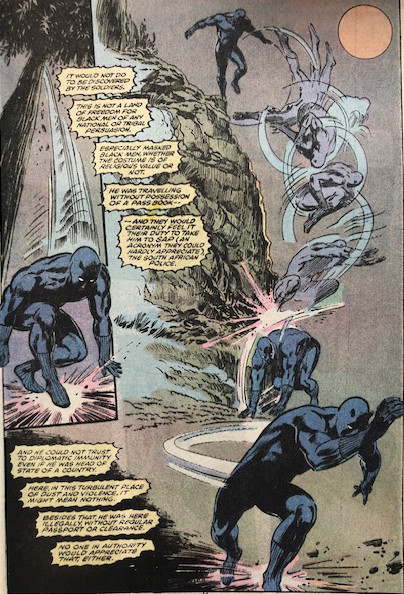
B. Black Panther, "Panther's Quest" [1/25]
Don McGregor's "Panther's Rage" from the mid-70s is a big deal (and a contribution that now seems to be receiving its deserved critical esteem), so this 25-part Black Panther story is no small affair (and the longest we'll see in MCP). Premise-wise, T'Challa begins the search for his mother on the basis of a vague rumor circulating in South Africa. Colan's pencils (and brush) offer a swirly, dynamic feel that's a notable counterpoint to the fully rendered Kane and Graham pencils of "Panther's Rage" but the result is, on balance, inviting--heavier on motion than musculature, replete with shadows. The knock on this feature--and, sadly, it's one that won't go away--is the distractingly scratchy, scrambled outline for the box narrative captions, which, quite sadly, crowd out and otherwise obscure and distract from some nifty layouts and asymmetric paneling from Colan.
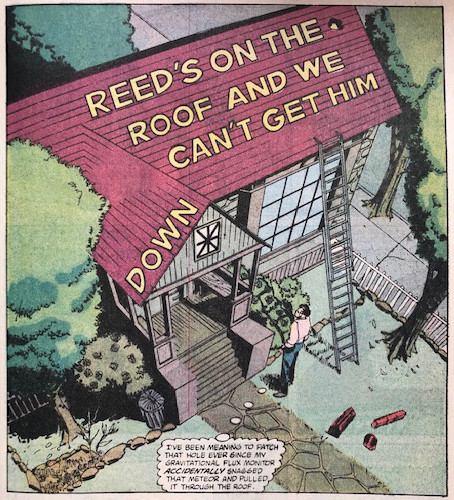
C. Mr. Fantastic, "Reed's on the Roof and We Can't Get Him Down"
The most straightforwardly comedic piece we've seen in MCP up to this point. Chris Henderson plays Reed's eggheadery up for a home repair pratfall and a solid gag with Sue as Invisible Woman saving an incognito Reed.

There's ample warm humor here and Mike Harris has fun hitting the comedic marks with a host of reaction shots and cleverly angled panels. Light but agreeable sitcom fare that's also oddly, emotionally credible.
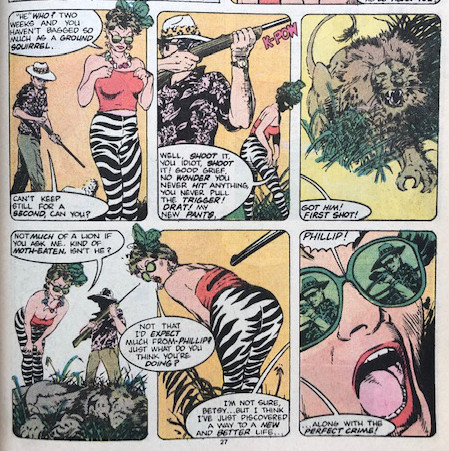
D. Shanna the She-Devil, "A Tooth for a Tooth"
Bruce Jones handles story and art for a Shanna piece that's half murder mystery and half jungle angst regarding poachers. Jones' work on the safari scenery and, in particular, the cats ranges from good to inspired though he meets with less success in the heavily modelled human figures. Shanna rather swiftly dispenses with a husband's frame-up of a lion for his wife's murder, but there's some creaky storytelling here muddled by awkward sequencing of flashbacks.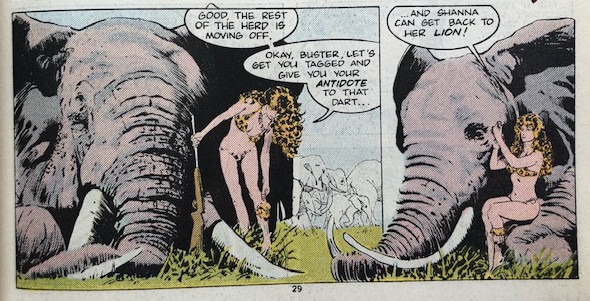
This is what might plausibly be labelled as "middle of the road" Shanna/Jungle Action: a modest but strong voice for the character but undeniable and overt trappings of genre sexism--most notably, a scantily clad rear that seems remarkable for its receipt of CCA approval. For all that, there are a host of small touches that elevate the feature over similar fare. These are, as one might expect, wholly on the art side--e.g., the wife's zebra print pants, a bounding jeep, and a Hal Foster-esque elephant.
Power Ranking: Black Panther (B+), Mister Fantastic and Invisible Woman (B+), Colossus (B) Shanna the She-Devil (B-)